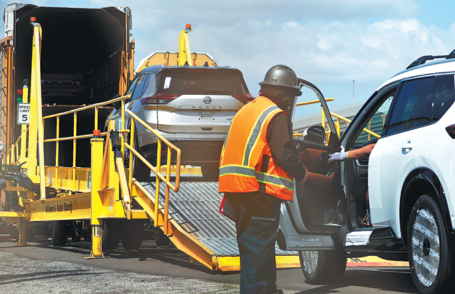Surcharges have consumers moving fast

Allan Cheng, an auto dealer in Los Angeles, recently put up a post on social media informing his customers that due to the recent big fluctuations in vehicle prices and inventory, they would no longer be able to provide a unified quotation reference as they had in the past.
"We expect the cost of vehicles from at least 20 brands to increase by anywhere from $4,000 to $12,500 due to the tariffs," Cheng told China Daily.
The new tariffs, announced by US President Donald Trump last Wednesday, have hit foreign-made cars and light-duty trucks. The 25 percent tariff on all imported vehicles took effect on Thursday.
Cheng explained that many key components of vehicles are manufactured in Mexico or Canada. As a result, the new tariffs are expected to drive up prices significantly in April.
Scott Jones, a resident of Rancho Santa Margarita, had been considering a new car for months, hoping to replace his aging car in the summer. However, the US administration's decision to impose new auto tariffs has forced him to expedite his purchase.
Jones had been considering a hybrid vehicle. With tariffs set to significantly increase costs on foreign-made vehicles, he feared waiting would mean paying thousands of dollars more. After negotiating a deal, he drove his new SUV home recently.
"I didn't want to risk the price jumping in a few months. It made sense to buy now," Jones said.
Broader trend
His decision reflects a broader trend among car buyers. Auto dealerships in California have reported a noticeable surge in demand as consumers rushed to secure foreign-made vehicles before the 25 percent tariff took effect.
"The talk of a potential price increase is spreading. While we can't say for certain what will happen, right now it might be wise to make a purchase to avoid any surprises later," said Elsie Mooney, a sales associate at a car dealership.
Critics, including auto industry executives, warn that the new policy could have devastating effects on manufacturers and consumers alike. The economic costs and benefits of tariffs are different now than in the past due to the rise of global value chains, according to Robert Johnson, a professor of economics at the University of Notre Dame.
"The North American automobile industry is deeply integrated, with vehicles assembled in the US containing a significant number of imported parts, while cars assembled in Mexico or Canada rely on US suppliers," Johnson said. "Tariffs, therefore, disrupt supply chains, raise production costs and ultimately impact consumer prices."
Research from the Yale Budget Lab projects that tariffs will drive up vehicle prices by an average of 13.5 percent, adding roughly $6,400 to the cost of a typical new 2024 model.
The auto industry is already bracing for widespread consequences. The Center for Automotive Research estimates that if tariffs remain in place, US car sales could decline by up to 2 million units annually. General Motors, Ford and Stellantis — major automakers with extensive supply chains spanning North America — are expected to face increased costs, which may be passed on to consumers.
Johnson noted the hidden consequences of tariffs in an interconnected market. While the goal might be for consumers to buy more US-assembled cars instead of those assembled in Mexico, US cars contain imported parts.
"This makes the shift in demand that occurs as a result of raising the tariff less attractive to the government," he explained. "Because it's losing some of the benefits of that tariff to foreign auto parts suppliers."
Agencies contributed to the story.
renali@chinadailyusa.com


Most Viewed
- Foreign Ministry responds to US tariff increase to 245%
- Ten photos from across China: April 11
- FDA calls Alibaba's AI model for early pancreatic cancer screening a breakthrough
- Riding rising wave of arrivals, China's guides give tourists the local edge
- China's homegrown jetliner C909 begins commercial service in Vietnam





















